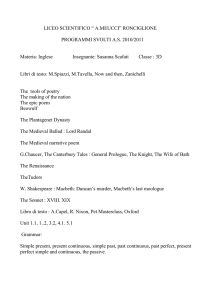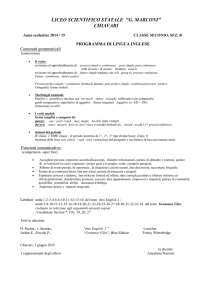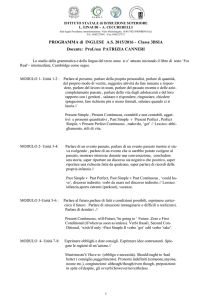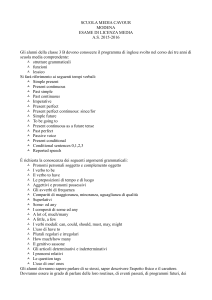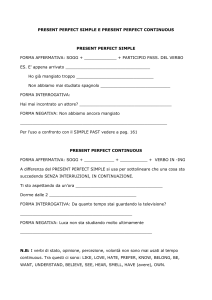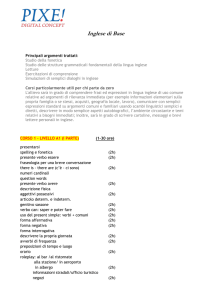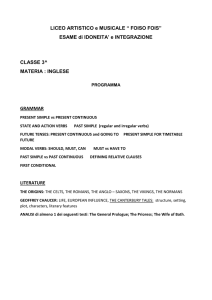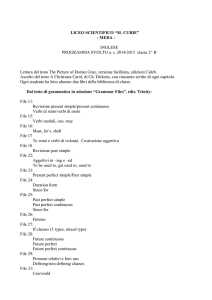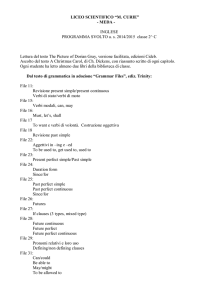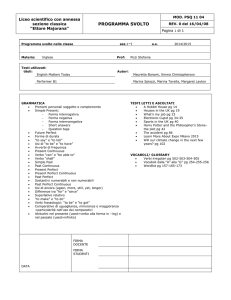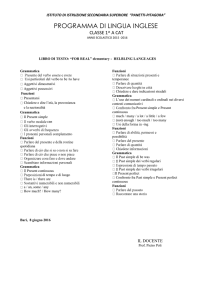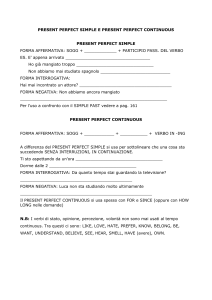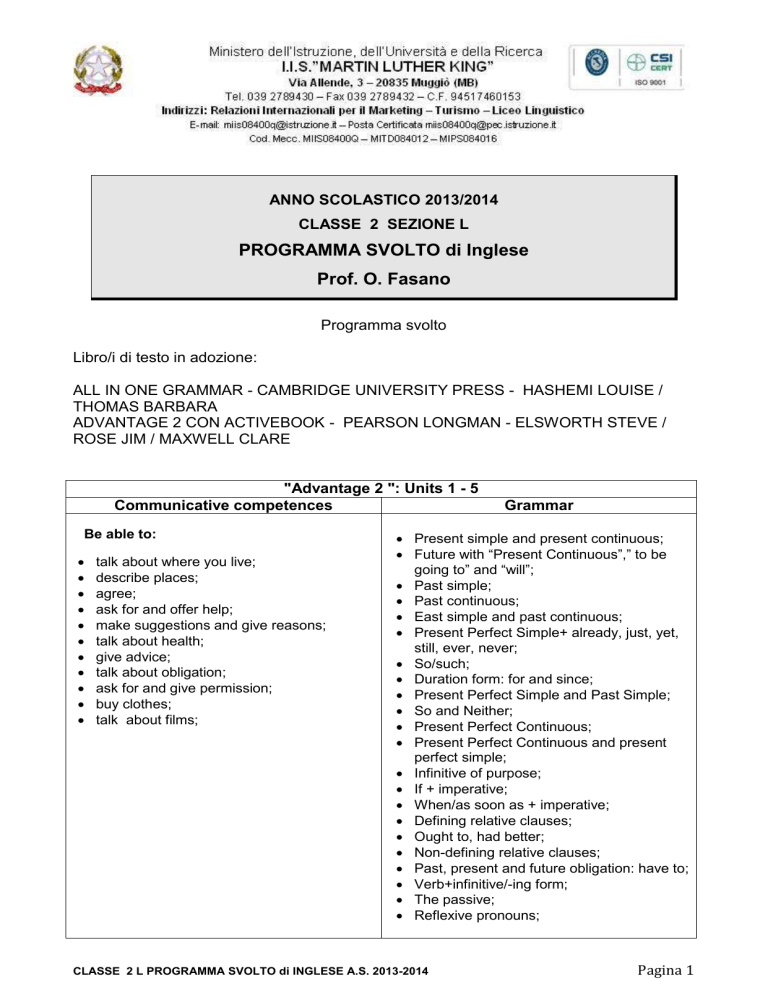
ANNO SCOLASTICO 2013/2014
CLASSE 2 SEZIONE L
PROGRAMMA SVOLTO di Inglese
Prof. O. Fasano
Programma svolto
Libro/i di testo in adozione:
ALL IN ONE GRAMMAR - CAMBRIDGE UNIVERSITY PRESS - HASHEMI LOUISE /
THOMAS BARBARA
ADVANTAGE 2 CON ACTIVEBOOK - PEARSON LONGMAN - ELSWORTH STEVE /
ROSE JIM / MAXWELL CLARE
"Advantage 2 ": Units 1 - 5
Communicative competences
Be able to:
talk about where you live;
describe places;
agree;
ask for and offer help;
make suggestions and give reasons;
talk about health;
give advice;
talk about obligation;
ask for and give permission;
buy clothes;
talk about films;
Grammar
Present simple and present continuous;
Future with “Present Continuous”,” to be
going to” and “will”;
Past simple;
Past continuous;
East simple and past continuous;
Present Perfect Simple+ already, just, yet,
still, ever, never;
So/such;
Duration form: for and since;
Present Perfect Simple and Past Simple;
So and Neither;
Present Perfect Continuous;
Present Perfect Continuous and present
perfect simple;
Infinitive of purpose;
If + imperative;
When/as soon as + imperative;
Defining relative clauses;
Ought to, had better;
Non-defining relative clauses;
Past, present and future obligation: have to;
Verb+infinitive/-ing form;
The passive;
Reflexive pronouns;
CLASSE 2 L PROGRAMMA SVOLTO di INGLESE A.S. 2013-2014
Pagina 1
Culture Gym
An unexpected murder;
Anglo Saxon stories by the firelight;
One ring to Rule them all:
Detective stories from Africa;
Dear Diary;
Is the Planet in Danger?;
The Painfulness of growing up;
All In One Grammar
Unit 3
I tempi del passato (2)
Il present perfect simple;
Il present perfect simple con just, already, still, yet, ever, never;
Have gone e Have been;
Il present perfect simple vs il past simple;
Il present perfect continuous;
Il present perfect simple / continuous con for e since;
Unit 4
I tempi del passato (3)
Il "Past Perfect simple";
Il "Past Perfect simple" e il "Past simple";
Il "Past perfect continuous";
Il "Past perfect continuous" vs il "Past perfect simple";
"Used to" e "Would";
"Used to" vs "be used to" vs "get used to";
Unit 10
Gli aggettivi
Posizione degli aggettivi;
Ordine degli aggettivi;
Aggettivi in -ing / -ed;
Sosantivi usati come aggettivi;
Aggettivi di nazionalità;
Avverbi che modificano gli aggettivi (il superlativo assoluto);
Comparativi e superlativi di maggioranza;
Comparativi e superlativi irregolari;
Comparativi di uguaglianza;
Compartivi e superlativi di minoranza;
Comparativi: alcuni casi particolari;
CLASSE 2 L PROGRAMMA SVOLTO di INGLESE A.S. 2013-2014
Pagina 2
Unit 12
I relativi - introduzione;
I pronomi relativi: "which", "who" e "that";
Omissione del pronome relativo;
"Where", "When", "Whose" e "Why";
Frasi relative determinative e non determinative ("Defining" e "Non-defining relative
clauses");
Pronomi relativi con preposizioni;
Frasi relative espresse con il Participio (A Message saying..., The people invited...);
Unit 15
Il Passivo - Introduzione;
Il Passivo: Come si forma, quando si usa;
Usi del Passivo;
Il Passivo dei verbi con preposizione;
Il complemento di Agente: By;
Il "Sì" passivante;
Il Passivo dei verbi con due oggetti;
To have something done;
Unit 16
Il Discorso indiretto;
Verbo introduttivo al passato;
Futuro con will e frasi condizionali nel discorso indiretto;
Verbo introduttivo al presente;
Elemti della frase che cambiano: pronomi ed espressioni di tempo e di luogo;
Say e tell
Altri verbi usati per introdurre il discorso indiretto: answer, remind, invite, order ....;
suggest;
Domande indirette;
Reading of two of Oscar Wilde's fairy-tales
text analysis :"The Nightingale and the Rose!
text analysis: "The Happy Prince"
Muggiò, 03 giugno 2014
I Rappresentanti di Classe
Marta Sironi
Il Docente
Prof. Orlando Fasano
Gjergji Prifti
CLASSE 2 L PROGRAMMA SVOLTO di INGLESE A.S. 2013-2014
Pagina 3

